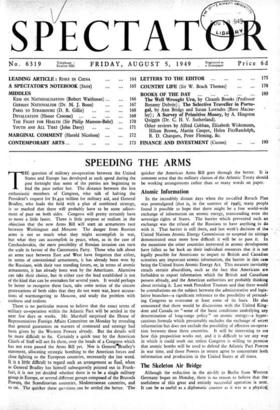Atomic Information
In the incredibly distant days when the so-called Baruch Plan was promulgated (that is, in the summer of 1946), many people found it possible to hope that there might be a free world-wide exchange of information on atomic energy, transcending even the sovereign rights of States. The barrier which prevented such an exchange was the refusal of the Russians to have anything to do with it. That barrier is still there, and last week's decision of the United Nations Atomic Energy Commission to suspend its sittings demonstrated once more how difficult it will be to pass it. In the meantime the other countries interested in atomic development have fallen so far back on their individual resources that it is not legally possible for Americans to impart to British and Canadian scientists any important atomic information, the barrier in this case being the United States Atomic Energy Act. This measure inevitably entails certain absurdities, such as the fact that Americans are forbidden to export information which the British and Canadians possess already, and the American authorities are probably thinking about revising it. Last week President Truman said that there would be consultations on the subject between the administrative and legis- lative branches—a significant reference to the possibility of persuad- ing Congress to overcome at least some of its fears. He also announced that there would be discussions with the United King- dom and Canada on " some of the basic conditions underlying any determination of long-range policy " on atomic energy—a hyper- cautious formula which presumably excludes the exchange of secret information but does not exclude the possibility of effective co-opera- tion between these three countries. It will be interesting to see how this proposition works out, and it is difficult to see any way in which it could work out unless Congress is willing to promise that atomic bombs will be used to defend the Atlantic Pact Powers in war time, and those Powers in return agree to concentrate both information and production in the United States at all times.


































